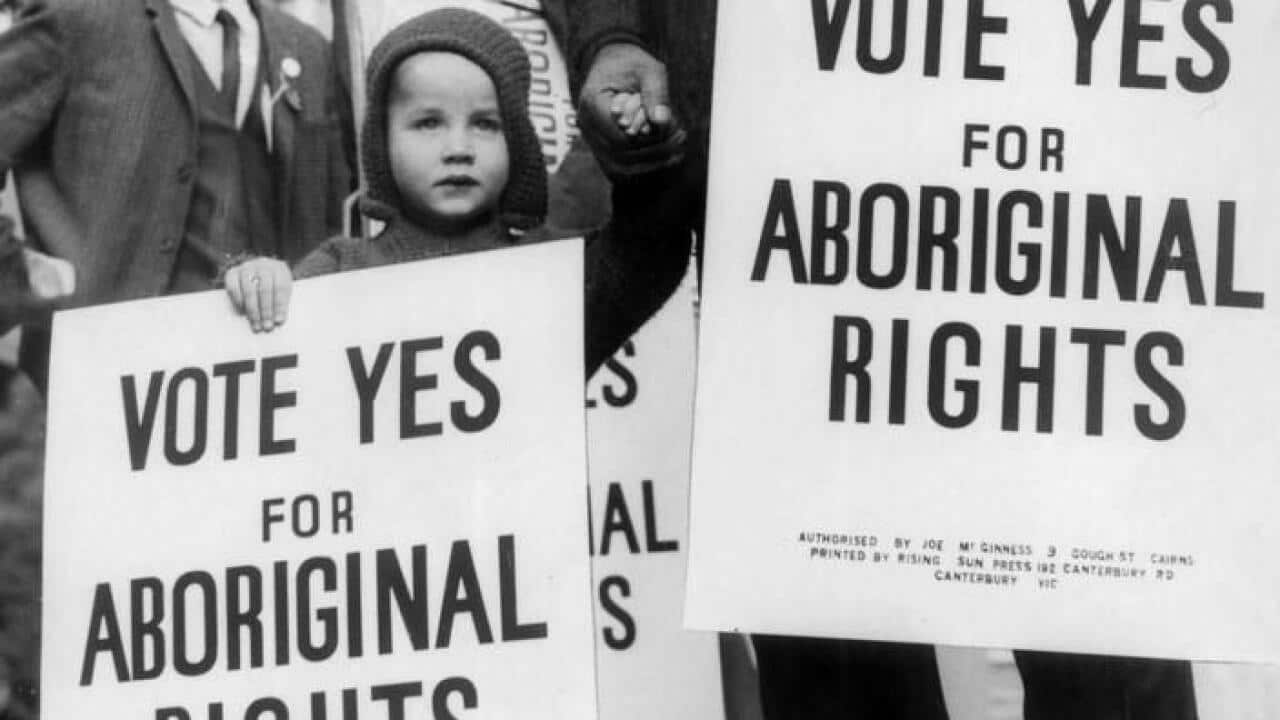Cape York Aboriginal activist and leader Dr Evelyn Scott has passed away this morning, her family announced in a statement.
"It is with great sadness that we announce that our mother and grandmother, the Aboriginal leader, Dr Evelyn Scott AO, passed away in the early hours of today. She died peacefully with her family surrounding her," the statement read.
"She was a remarkable woman whose life, spanning eight decades, was in many ways a metaphor for the changing circumstances for her people."
Dr Scott was a key campaigner for Aboriginal rights and was active in the 1967 referendum campaign to recognise Indigenous Australians.
"Born in Ingham in Far North Queensland in 1935, she was the daughter of a man whose own father was brought to Queensland in chains to work the sugar industry as a slave labourer after being kidnapped from Vanuatu."
Evelyn’s father's early advice: “If you don’t think something is right, then challenge it”, influenced her life as a campaigner for social justice in Australia, and abroad in places Apartheid South Africa.
Evelyn thanked her husband Allan, a member of the Communist Party, for introducing her to political activism but it wasn't until her move to Townsville in the 1960s she observed discrimination against Aboriginal people in housing, employment, education, and in the provision of health services.
"She saw too how Aboriginal people were at the mercy of an often racist police force and, following her father’s advice, she challenged this treatment."
"It was during these turbulent times that she met Joe McGuiness who would become her life-long friend and mentor.
Meriam land rights legend, Eddie Mabo was a close friend from their early days of shared political activism in Townsville."
At the start of her political activism Aboriginal and Torres Strait Islander people in Queensland suffered under the various iterations of the notorious Aborigines Protection Act whereby they were classified as minors under the “protection” of the Queensland Government and had no political rights.
"Today, the “Act” has gone, First Nations people sit in both the State and Federal Parliament and the concept of a treaty has entered mainstream political debate. The change of circumstances in Queensland and across the country owes much to the tireless and intelligent campaigning of our mother."
Evelyn became the first General-Secretary of the newly-Indigenous-controlled Federal Council for the Advancement of Aboriginals and Torres Strait Islanders in 1973 and was appointed as Chairperson of the Council for Aboriginal Reconciliation between 1997 and 2000.
As a committed environmentalist who campaigned for protection of the Great Barrier Reef and believed in the need for stronger Indigenous voices in land and sea management she became a board member of the Great Barrier Reef Marine Park Authority in the 1980s.
"Our mother’s work and achievements were recognised across her career. She was granted the Queen’s Jubilee Medal in 1977 for her contribution to advancement of Aboriginal and Torres Strait Islander peoples and in 2003 she was a recipient of the Queensland Greats award as an extraordinary Queenslander whose remarkable long-term or lifetime achievements made a significant contribution to the history and development of Queensland."
She received two honorary doctorates; in 2000 from the Australian Catholic University for work in the areas of reconciliation, the advancement of Aboriginal and Torres Strait Islander peoples and the advancement of women; and in 2001 from James Cook University in recognition of outstanding service to the Queensland community, exceptional service to the University and exceptional contribution to human well-being.
That same year she was also awarded an Officer in the General Division of the Order of Australia.
These awards were important to her but more important was the recognition and friendship she received from Aboriginal and Torres Strait Islander people particularly from the remote communities of Cape York and the Torres Strait.
One of her extraordinary talents was her ability to engage with all sections of Australian society. She advised and advocated to Prime Ministers, kept the company of Mohammed Ali and Queen Elizabeth II, and rubbed shoulders with some of Australia’s richest corporate leaders. However, our mother, was most comfortable sitting in the red dust or beach sand yarning with Elders and leaders of the various First Nations of remote Australia.
"Our mother loved to fish and every day was a good day for fishing as far as she was concerned," said the statement.
Her other greatest joy, outside of fishing and political activism, was spending time with her grandchildren, instilling in them the values she learnt as a child from her father; those of honesty, hard work, respect, and justice."
She is survived by her son, four daughters and seven grandchildren.









